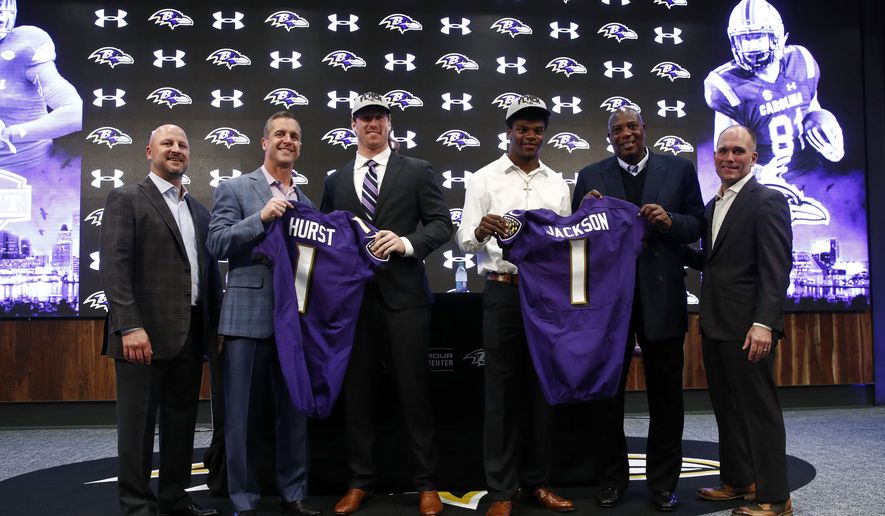Who’s picking is more important than who gets picked

By DERON SNYDER (as published in The Washington Times)
The NFL draft isn’t art, science, or luck, though all three elements play a part.
There’s no foolproof method for 32 teams to divvy up college football players. Teams even disagree that concentrating solely on their sport is prudent; the Philadelphia Eagles drafted an Australian native who stands 6-foot-8, weighs 346 pounds, and has never played a down of football.
“It’s a fun sport,” 20-year-old rugby star Jordan Mailata said in an NFL Network interview. “Why not give it a try? It’s been an absolute brainstorm of an experience.”
The Eagles’ brain trust thought enough of the prospect to move up 17 spots to grab him, albeit in the seventh round with the 233rd pick. Mailata, who spent several months learning football and blocking techniques at a Florida training facility, is considered an offensive tackle momentarily.
Having constructed a roster that won the last Super Bowl, Philadelphia’s front office can live off its reputation for a couple of seasons. The Eagles could bring home a ‘D’ on their draft report card and no one would care. (Speaking of report cards, they might be the only exercise more useless than mock drafts; there should be a three-year moratorium before grades are assigned).
Winners and losers of the 2018 draft will be determined over time. Those results will be offshoots of the real challenge NFL franchises face each spring. It’s a question they must get right to enjoy any success.
It isn’t which players a team should pick.
It’s who they should choose to pick the players.
Take, for instance, two franchises with shared history that’s wildly divergent: the Cleveland Browns and the Baltimore Ravens.
The Ravens were formed in 1996 when everything except the Browns’ colors, logos and heritage moved from Cleveland. Among the personnel who moved to Baltimore was Ozzie Newsome. He became the NFL’s first African-American general manger and maintained that role entering last week’s draft, with two Super Bowl-winning teams on his resume.
The Browns were inactive from 1996 until being restored as an expansion franchise in 1999. They entered last week’s draft with their eighth front-office regime in 19 years and it shows; they have averaged 4.6 victories per season (none last year) since 1999 and made one playoff appearance.
Now GM John Dorsey has the reins in Cleveland and his first move was a bold one, selecting quarterback Baker Mayfield with the No. 1 pick. The surprising choice of cornerback Denzel Ward at No. 4 got lukewarm reviews, leading some observers to wonder if Cleveland is doomed to fare poorly.
Dorsey can point to a record of success in 26 years as an NFL player personnel executive, including four seasons as GM in Kansas City. The Chiefs improved from 2-14 in his first year to 11-5 in his second year. During his tenure, Kansas City had the league’s fourth-highest winning percentage and recorded the greatest single-season turnaround in NFL history (finishing 11-5 after a 1-5 start in 2015).
While Dorsey is just getting started in Cleveland, Newsome is winding down in Baltimore.
Newsome called Ferris State defensive end Zach Sieler during the seventh round Saturday night. “You now I’ve been doing this for 22 years,” Newsome said via a video on the Ravens’ website. “You’re my last pick.”
Sieler was Newsome’s 190th pick in a stellar front-office career, one matches his Hall-of-Fame career as a tight end. It would be difficult to have a draft class as successful as his initial one – Hall of Famers Jonathan Ogden and Ray Lewis with his first two picks – but he closed with another pair of first-rounders at the top, tight end Hayden Hurst and quarterback Lamar Jackson.
The Ravens won only 16 games over their first two seasons, but Newsome was setting the foundation. Many observers believe he’s left the team on solid ground as he handoffs to long-time lieutenant Eric DeCosta and exits for an undefined role.
“I really feel very good about this class and how it came to be,” Newsome told reporters Saturday. “Twelve picks, we made six trades, we addressed a lot of areas on the football team. I think after today, when we finish with the undrafted college free agents, that the Baltimore Ravens are no doubt in my mind, a better football team.”
Good and better teams don’t happen by accident. Fans in Baltimore and Cleveland can see the fingerprints responsible for the last two decades. DeCosta will try to follow the pattern while Dorsey tries to wipe ‘em clean.
Check back in about five years for their report cards.
— Brooklyn-born and Howard-educated, Deron Snyder writes his award-winning column for The Washington Times on Tuesdays and Thursdays. Follow him on Twitter @DeronSnyder.
 Follow
Follow
